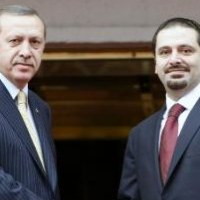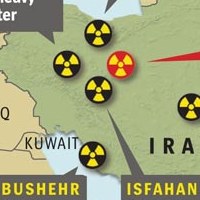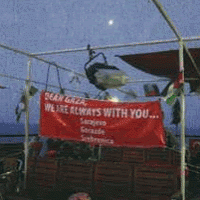![]()
Sat, Sept 24, 2011 | WikiLeaks
WikiLeaks: Turkish FM Davutoglu: “Yes, We are the New Ottomans”
Turkish foreign minister Davutoglu explaining “New Ottoman” strategy of the Turkish Islamist government in this 2009 Wikileaks cable.
In a recent speech before the governing Justice and Development Party (AKP) retreat, Turkey’s Foreign Minister Davutoglu appeared to embrace the concept of Neo-Ottomanism as a framework for Turkish foreign policy. Though Davutoglu and the MFA have tried to step back from the statement (which they insist was taken out of context), the concept reinforces Turkey’s aspirations to re-engage estranged neighbors and to serve as mediator in conflicts in the Middle East and the Balkans — particularly coming so soon after Davutoglu’s Sarajevo speech, which raised some hackles in the region. It also leaves AKP open to criticisms of “creeping” Islamization, naivete, and anti-Westernism.
Source: WikiLeaks
Reference ID: 09ANKARA1717
Created: 2009-12-03 13:52
Classification: SECRET
Origin: Embassy AnkaraVZCZCXRO6456
PP RUEHDBU RUEHFL RUEHKW RUEHLA RUEHNP RUEHROV RUEHSL RUEHSR
DE RUEHAK #1717/01 3371352
ZNY CCCCC ZZH
P 031352Z DEC 09
FM AMEMBASSY ANKARA
TO RUEHC/SECSTATE WASHDC PRIORITY 1364
INFO RUEHZL/EUROPEAN POLITICAL COLLECTIVE
RUEHIT/AMCONSUL ISTANBUL 6595
RUEAIIA/CIA WASHDC
RHEFDIA/DIA WASHINGTON DC
RUEKJCS/JOINT STAFF WASHDC//J-3/J-5//
RHEHAAA/NSC WASHDC
RUETIAA/NSACSS FT GEORGE G MEADE MD
RUEHAK/TSR ANKARA TUC O N F I D E N T I A L SECTION 01 OF 02 ANKARA 001717
SIPDIS
DEPARTMENT ALSO FOR EUR/SE
E.O. 12958: DECL: 12/01/2019
TAGS: PGOV PREL PINR TU
SUBJECT: FM DAVUTOGLU: YES, WE ARE THE NEW OTTOMANSREF: A. ANKARA 1688
¶B. ANKARA 1618
¶C. ANKARA 1651Classified By: POL Counselor Daniel O’Grady, for reasons 1.4(b,d)
¶1. (C) SUMMARY: In a recent speech before the governing
Justice and Development Party (AKP) retreat, Turkey’s Foreign
Minister Davutoglu appeared to embrace the concept of
Neo-Ottomanism as a framework for Turkish foreign policy.
Though Davutoglu and the MFA have tried to step back from the
statement (which they insist was taken out of context), the
concept reinforces Turkey’s aspirations to re-engage
estranged neighbors and to serve as mediator in conflicts in
the Middle East and the Balkans — particularly coming so
soon after Davutoglu’s Sarajevo speech, which raised some
hackles in the region. It also leaves AKP open to criticisms
of “creeping” Islamization, naivete, and anti-Westernism.
END SUMMARY.¶2. (C) Twice yearly, AKP party leaders and members of
parliament meet at Kizilcahamam for a consultative retreat to
go over party policies and the state of Turkey in a relaxed,
informal environment. At the most recent retreat, held
November 21 and 22, FM Davutoglu co-opted his critics’
derisive term for his personalized foreign policy, saying,
“Yes, we are the New Ottomans.” In so doing, he made
coherent the past six years of Turkish foreign policy, which
has seen an intensive interest in being part of peace
negotiations stretching from Bosnia through Palestine to
Afghanistan, the opening of embassies throughout much of
Africa, and rapprochement with previous rivals, such as Iran,
Syria, and Armenia.¶3. (C) Davutoglu had previously hinted at such a policy in a
speech made in Sarajevo on October 16, in which he envisioned
an economically and culturally integrated Balkans and Middle
East as the driver of a peaceful, affluent civilization, and
not the crisis-ridden periphery it is perceived to be today.
In his estimation, the Ottoman Empire is the “only positive
exception” to have created such an entity, and Turkey, as
successor to the Ottoman state, should be the focus of the
re-establishment of a strong Eastern Mediterranean. Turkey’s
relative power, stability, and affluence would allow it to
recreate what Davutoglu sees as fundamental to a strong,
self-assured political environment: cultural integration,
economic interaction, and political authority.¶4. (C) Davutoglu and the MFA have both tried to distance
themselves from the concept of Neo-Ottomanism, claiming that
the press reported his statement entirely out of context.
Nonetheless, the term roughly coincides with Davutoglu’s
world-view and adds an academic and ideological backbone to
his pragmatic “zero problems with neighbors” policy. It
trades on common historical and cultural traits among the
countries in Turkey’s larger neighborhood to form the basis
for closer cooperation rather than conflict. The theory
conveniently justifies why Turkey — as a comparatively
stable, democratic, affluent country — should serve as the
anchor for such a geopolitical alignment.¶5. (C) Borrowing from Western rhetoric that Turkey is a
bridge between the East and the West, Turkey is aspiring to
broaden its horizons to include not just Europe but the
Middle East, North Africa, and Central Asia in its strategic
considerations as well. The policy also attempts to promote
two popular trains of thought among conservative Turkish
intellectuals: the concepts of a global Islamic solidarity
(previously promoted by former Prime Minister Necmettin
Erbakan) and the concept of a Turkish-Islamist synthesis
(popular in nationalist circles and also among members of the
Fethullah Gulen religious community).¶6. (C) AKP’s domestic detractors, however, see the policy as
more evidence of Turkish society slowly turning away from the
West; embracing regional autocrats, such as Bashar al-Assad,
Mahmud Ahmedinejad, and Omar al-Bashir; and Islamization of
the populace as part of their plan to one day install Sharia
law “overnight.” Turkey’s choice of regional friends does at
times highlight its religious outlook more than cultural
ones: estranging historical trade and military partner
Israel over the Gaza crisis sits unsteadily when Turkey comes
to Sudan’s defense. But Turkey does not only seek friendshipANKARA 00001717 002 OF 002
with Muslim countries, as its recent outreach to Armenia and
Serbia underscores. Still, individual players in the region
may have reason to be skeptical of Turkish motives, be it
because of geopolitical rivalry (Egypt and Iran),
historically-based distrust (Armenia, Serbia, and Cyprus), or
the perception of being unfairly treated (Israel).JEFFREY
“Visit Ankara’s Classified Web Site at http://www.intelink.sgov.gov/wiki/Portal:Turkey”



 RSS
RSS












WikiLeaks: Turkish FM Davutoglu: “Yes, We are the New Ottomans” | Middle East News, Articles, Backgr http://t.co/gSsozRdu
[…] don’t waste any time on the lies and denials, here’s Turkey’s foreign minister explaining the new policy of Turkey being leader of the Middle East as he secretly expressed it to a meeting […]
#Wikileaks: Turkish FM Davutoglu: Yes, We are the New Ottomans … http://j.mp/qfNwHL #blog
WikiLeaks: Turkish FM Davutoglu: “Yes, We are the New Ottomans” | Middle East News, Articles, Backgr http://t.co/gSsozRdu
RT @wikicables: #Wikileaks: Turkish FM Davutoglu: Yes, We are the New Ottomans … http://j.mp/qfNwHL #blog
RT @wikicables: #Wikileaks: Turkish FM Davutoglu: Yes, We are the New Ottomans … http://j.mp/qfNwHL #blog
#Wikileaks: Turkish FM Davutoglu: Yes, We are the New Ottomans … http://j.mp/qfNwHL #blog
http://t.co/GMkyHZnQ WikiLeaks: Turkish FM Davutoglu: “Yes, We are the New Ottomans …